Intro
Discover what Fluticasone Propionate is, a topical corticosteroid treating skin allergies, eczema, and dermatitis, with uses, side effects, and benefits explained, including nasal spray and cream applications.
Fluticasone propionate is a synthetic corticosteroid that is commonly used to treat various inflammatory conditions, including respiratory diseases such as asthma and chronic obstructive pulmonary disease (COPD). It is also used to treat skin conditions like eczema and psoriasis, as well as allergic rhinitis. The medication works by reducing inflammation and swelling in the affected areas, which helps to alleviate symptoms and improve quality of life.
Fluticasone propionate is a topical corticosteroid, which means it is applied directly to the affected area, either through inhalation, nasal spray, or topical cream. This targeted approach helps to minimize systemic side effects, which are common with oral corticosteroids. The medication is available in various forms, including inhalers, nasal sprays, and creams, each designed to deliver the active ingredient to the specific area of the body where it is needed.
The importance of fluticasone propionate lies in its ability to provide effective relief from inflammatory symptoms, while also being relatively safe and well-tolerated. This makes it a popular choice among healthcare professionals and patients alike. However, as with any medication, it is essential to use fluticasone propionate under the guidance of a healthcare professional, as improper use or excessive use can lead to adverse effects.
How Fluticasone Propionate Works
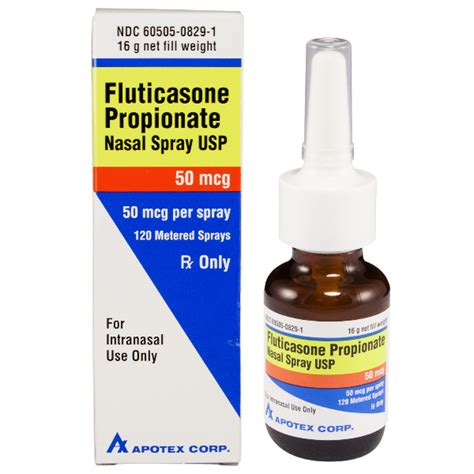
The specific mechanism of action involves the inhibition of inflammatory mediators, such as prostaglandins and leukotrienes, which are responsible for promoting inflammation. By blocking these mediators, fluticasone propionate reduces the production of pro-inflammatory chemicals, which in turn decreases inflammation and swelling. This targeted approach helps to provide relief from symptoms, while also reducing the risk of long-term damage to tissues and organs.
Benefits of Fluticasone Propionate
The benefits of fluticasone propionate are numerous, making it a popular choice among healthcare professionals and patients. Some of the key benefits include: * Effective relief from inflammatory symptoms * Reduced risk of systemic side effects * Targeted approach, minimizing damage to surrounding tissues * Available in various forms, including inhalers, nasal sprays, and creams * Highly potent, providing effective relief at low dosesThese benefits make fluticasone propionate an attractive option for patients suffering from inflammatory conditions. However, as with any medication, it is essential to weigh the benefits against the potential risks and side effects.
Types of Fluticasone Propionate
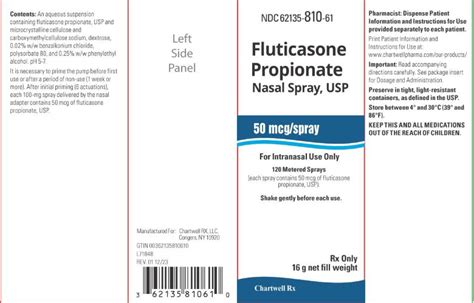
Each form of fluticasone propionate has its own unique characteristics and benefits. For example, inhalers provide quick relief from respiratory symptoms, while creams provide long-lasting relief from skin conditions. The choice of form will depend on the specific condition being treated and the individual patient's needs.
Side Effects of Fluticasone Propionate
While fluticasone propionate is generally well-tolerated, it can cause side effects, especially when used improperly or in excess. Some common side effects include: * Throat irritation * Coughing * Hoarseness * Nasal congestion * Skin irritationThese side effects are usually mild and temporary, resolving on their own within a few days. However, in some cases, more serious side effects can occur, such as:
- Increased risk of infection
- Adrenal suppression
- Osteoporosis
- Cataracts
- Glaucoma
It is essential to report any side effects to a healthcare professional, as they can help to manage and minimize their impact.
Uses of Fluticasone Propionate
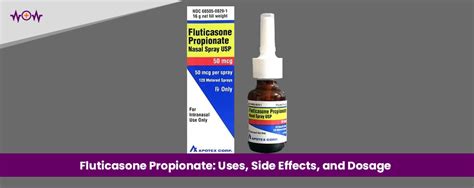
The medication is highly effective in reducing inflammation and alleviating symptoms, making it a popular choice among healthcare professionals and patients. However, it is essential to use fluticasone propionate under the guidance of a healthcare professional, as improper use or excessive use can lead to adverse effects.
Precautions and Interactions
When using fluticasone propionate, it is essential to take precautions and be aware of potential interactions. Some precautions include: * Using the medication only as directed by a healthcare professional * Avoiding excessive use or prolonged use * Monitoring for signs of infection or other side effects * Avoiding use in patients with certain medical conditions, such as tuberculosis or herpes simplexFluticasone propionate can also interact with other medications, such as:
- Other corticosteroids
- Immunosuppressants
- Anti-inflammatory medications
- Antihistamines
It is essential to inform a healthcare professional about any medications or supplements being taken, as they can help to manage and minimize potential interactions.
Administration and Dosage
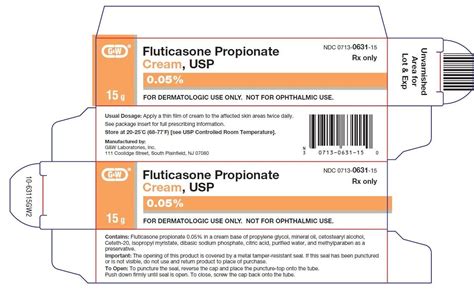
It is essential to follow the instructions provided by a healthcare professional and to use the medication only as directed. Excessive use or prolonged use can lead to adverse effects, while underuse can reduce the effectiveness of the medication.
Storage and Disposal
Fluticasone propionate should be stored in a cool, dry place, away from direct sunlight and moisture. The medication should be kept out of reach of children and pets, and should be disposed of properly when expired or no longer needed. Some tips for storage and disposal include: * Keeping the medication in its original packaging * Storing the medication at room temperature * Avoiding exposure to extreme temperatures or humidity * Disposing of the medication through a pharmacy or other authorized facilityBy following these guidelines, patients can help to ensure the safe and effective use of fluticasone propionate.
Conclusion and Final Thoughts
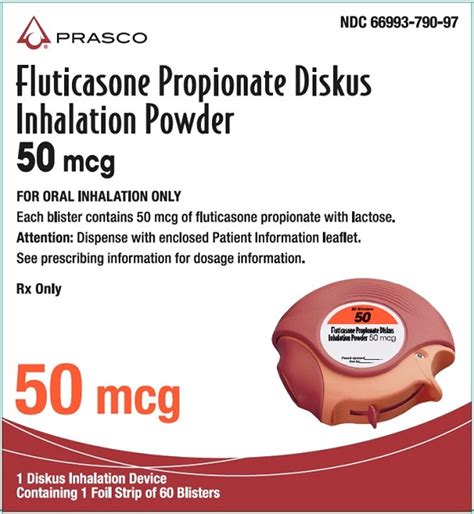
By understanding the benefits, side effects, and precautions associated with fluticasone propionate, patients can make informed decisions about their treatment and take steps to ensure safe and effective use. Whether used to treat respiratory conditions, skin conditions, or allergic rhinitis, fluticasone propionate is a valuable tool in the management of inflammatory diseases.
We invite you to share your thoughts and experiences with fluticasone propionate in the comments below. Have you used this medication to treat an inflammatory condition? What were your results, and what precautions did you take to ensure safe and effective use? By sharing your story, you can help others make informed decisions about their treatment and take control of their health.
What is fluticasone propionate used for?
+Fluticasone propionate is used to treat various inflammatory conditions, including respiratory diseases such as asthma and COPD, skin conditions like eczema and psoriasis, and allergic rhinitis.
How does fluticasone propionate work?
+Fluticasone propionate works by binding to specific receptors in the body, which triggers a response that reduces inflammation and suppresses the immune system.
What are the common side effects of fluticasone propionate?
+Common side effects of fluticasone propionate include throat irritation, coughing, hoarseness, nasal congestion, and skin irritation. More serious side effects can occur, such as increased risk of infection, adrenal suppression, osteoporosis, cataracts, and glaucoma.
How should I store and dispose of fluticasone propionate?
+Fluticasone propionate should be stored in a cool, dry place, away from direct sunlight and moisture. The medication should be kept out of reach of children and pets, and should be disposed of properly when expired or no longer needed.
Can I use fluticasone propionate if I have a medical condition or take other medications?
+It is essential to inform a healthcare professional about any medical conditions or medications being taken, as fluticasone propionate can interact with other medications and worsen certain medical conditions. A healthcare professional can help to determine the safest and most effective course of treatment.
